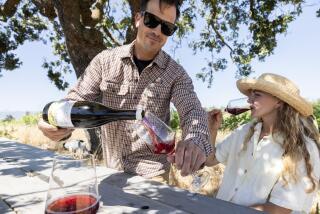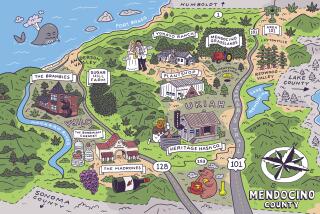County Line Harvest’s fruitful foray into Coachella farming
THERMAL, Calif. — One of the most highly regarded farms in Northern California, Petaluma-based County Line Harvest started growing organic vegetables in the Coachella desert to extend its production in the winter and spring. For owner David Retsky, who grew up in Beverly Hills, selling to Southern California was the logical next step, and almost like coming home.
It’s been a circuitous route for Retsky, 40. The son of a doctor, he became interested in agriculture after high school, when he stayed on a kibbutz in Israel. For several years in the early 1990s he worked for Fairview Gardens in Goleta, where Michael Ableman was his mentor, and sold at the Santa Monica farmers market. He studied horticulture at the Alan Chadwick Garden in Santa Cruz, then apprenticed at organic farms in Portugal, Hawaii and New Zealand, learning his trade.
In 2000 Retsky decided it was time to strike out on his own, and leased six acres near the border of Sonoma and Marin counties, where he specialized in baby lettuce in the warm months and radicchio in the winter. He sold to a wholesaler, Greenleaf Produce, to top restaurants and at farmers markets, including San Francisco Ferry Plaza and San Rafael Civic Center. He expanded to cultivate more than 30 acres.
However, in his upstate growing area, 400 miles north of Los Angeles, the season for lettuce and many crops “comes to a screeching halt” in late autumn, he said, because of the rain, cold and shorter day length. Following a strategy pioneered by Star Route, Capay and several other organic farms in Northern California, Retsky decided to set up southern growing grounds in the desert, where lettuce and many vegetables flourish during winter.
Two years ago he dispatched his girlfriend, Megan Strom, and a foreman, Oscar Rodriguez, to oversee a new planting on 80 acres in Thermal, just east of La Quinta. In addition to the farm’s signature baby lettuces, they planted specialty varieties of radicchio, Castelfranco, Rossa di Verona and Tardivo, grown from seed that Retsky brought back from a chicory festival in the Veneto region of Northern Italy. Rare here, the flowerlike, delightfully bitter Italian varieties should be a revelation for Southern Californians, and especially to local Italian chefs, once the season resumes in October.
On a visit last weekend, Retsky and Strom beamed proudly as they toured their farm, walking through lush rows of green and red vegetation set against a backdrop of stark, arid mountains. It was a preternaturally cool day for April in the desert, nearby peaks were dusted with snow, and both owners and their workers had to bundle up against fierce winds. But by this weekend temperatures should hit triple digits, and by July it will be so scorching that the farm will stop production until autumn.
Currently most of their crops are flourishing, but Retsky and Strom have faced a steep learning curve as they figured how to grow them organically in the desert, a very different environment from Sonoma in its climate, soils and pest pressures. So far they have not quite gotten the hang of growing tomatoes in the desert; the sun scalded their bell peppers; and their strawberries failed miserably, probably because of soil salinity problems, said Retsky. (Nearby conventional farmers, who are free to use non-organic fertilizers and pesticides, “were just jamming,” he noted.)
A month ago County Line South, as the new division is called, started selling at the Brentwood farmers market, where the stand currently offers a wide range of vegetables including lettuces, carrots, onions, chard, beets, radishes and fennel. On April 29 the farm will start at the Mar Vista market, and in coming months they’ll have shishito and Padron peppers, okra, cucumbers, basil and specialty melons such as Charentais and Snow Leopard.
Most of the farm’s business remains wholesale, so why bother with farmers markets? Partly to establish street cred with restaurants such as Son of a Gun, Cru, Milo and Olive, and Farmshop, which have started to order; and partly because it thrills Retsky to sell directly to the community where he grew up.
“It’s really exciting to be down here again, creating a farm from a blank canvas, and selling to restaurants and farmers markets that I know,” he said.
More to Read
Eat your way across L.A.
Get our weekly Tasting Notes newsletter for reviews, news and more.
You may occasionally receive promotional content from the Los Angeles Times.







